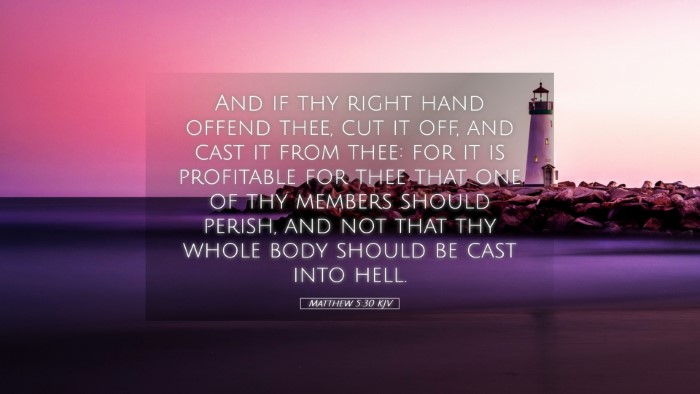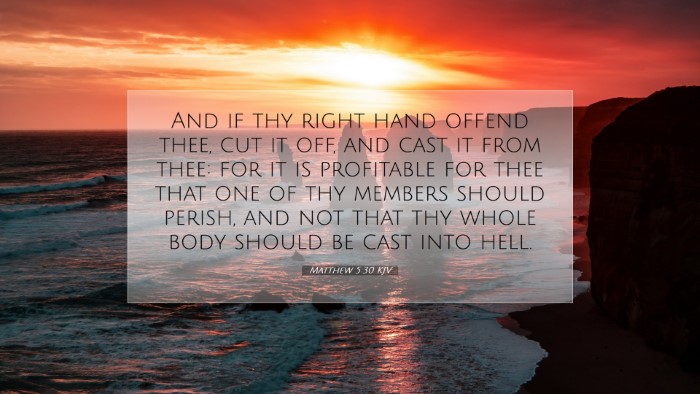Commentary on Matthew 5:30
Verse Overview: Matthew 5:30 states, "And if thy right hand offend thee, cut it off, and cast it from thee: for it is profitable for thee that one of thy members should perish, and not that thy whole body should be cast into hell."
Introduction
This verse is part of the larger Sermon on the Mount, where Jesus expounds upon the nature of the kingdom of heaven and the expectations of its citizens. In this particular verse, He employs hyperbole to emphasize the severity of sin and the seriousness with which believers should approach the battle against it.
Exegesis
The Right Hand as a Symbol: The right hand, typically viewed as a symbol of strength and favor, underscores the notion that even our most valued faculties can lead us into sin. The metaphor of "cutting off" serves to illustrate the drastic measures one should take to eliminate sin from their life.
Historical Context
In biblical times, the right hand was culturally admired and associated with strength and blessing. By suggesting one would sever it, Jesus communicates that anything—even what we consider our greatest attributes—can lead us astray.
Commentary Insights
-
Matthew Henry: Henry emphasizes that this verse calls for decisive action against sin. He suggests that the metaphorical act of cutting off represents a complete renunciation of habits that lead us away from righteousness. To be comfortable with our sins is to risk our eternal destination.
-
Albert Barnes: Barnes offers insight into the nature of sin and the very real consequences it bears upon the soul. He elucidates that the physical body can be sacrificed for the sake of the spirit, stressing the importance of prioritizing one’s spiritual well-being over physical comfort.
-
Adam Clarke: Clarke interprets the "right hand" as the metaphor for those lawful pleasures and gratifications of life. He posits that Christ urges us to eradicate these pleasures if they become stumbling blocks. The urgency in Clarke's commentary deepens the call to action that Jesus makes against complacency in sin.
Theological Implications
This verse raises profound theological questions about human nature and the nature of sin. The overwhelming message conveyed is that sin is serious, and the cost of sin is eternal separation from God. The hyperbolic call to amputate one's hand conveys the urgency of this message.
Soteriological Considerations
A key aspect of salvation is the recognition of sin's destructive power. Jesus emphasizes that the judgment for unrepented sin is eternal, demonstrating that spiritual health should supersede earthly concerns. It speaks directly to the need for believers to live in a state of constant vigilance against sin.
Practical Applications
The practical applications of Matthew 5:30 are as relevant today as they were 2000 years ago. A few key takeaways include:
- Vigilance Against Sin: Believers are called to examine their lives rigorously, seeking out anything that distracts from their relationship with Christ.
- Prioritize Spiritual Health: It is crucial to prioritize spiritual well-being over physical comforts, emphasizing that our ultimate goal is holiness.
- Community Support: Engaging in accountability within the Christian community can fortify individuals in their battle against sin.
- Radical Obedience: Jesus encourages a radical approach to obeying God, suggesting that anything less than extreme diligence can lead to eternal consequences.
Conclusion
Matthew 5:30 is a profound call to action that transcends the cultural and temporal boundaries of its original audience. The dire consequences of unrepented sin remind us of the urgency to evaluate our lives in light of eternity. By integrating the wisdom of church traditions through commentaries from Matthew Henry, Albert Barnes, and Adam Clarke, the weight of this verse resonates even more deeply with modern believers, imploring them to take sin seriously and respond with appropriate actions. As they navigate their spiritual journeys, may they find strength in Christ to sever the ties that bind them to sin, seeking ultimately to glorify God in their lives.


